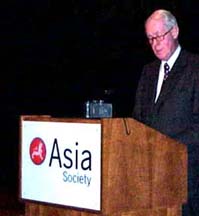
Cyrus Vance making a speech on Iran-U.S. relations at
the Asia Society
Photo by J. Javid
"US-Iran Relations: has the time come?"
Speech Delivered by the Honorable Cyrus R. Vance Former US
Secretary of State For "Distinguished Speaker Series" of American-Iranian
Council, Inc.
The Asia Society, New York City, January 13, 1999 -- Ladies and Gentlemen:
I am pleased to join you for Eftar this evening. Thank you Nick [Platt,
President of Asia Society] and Hooshang for a gracious introduction and
for organizing this event. A group of distinguished colleagues will join
me for the panel discussion that follows my comments.
Almost twenty years ago, as US Secretary of State, I participated in
the decision to end diplomatic relations between the United States and
Iran, a painful and difficult step taken in response to the attack on our
embassy in Tehran and the abduction of our diplomats during a period of
revolutionary turmoil. Months later, I took a second decision to resign
in protest to the failed military action, in order to bring about a change
in policy toward the hostage crisis. In the years that followed, I have
watched from the sidelines with frustration and sadness as relations between
our two countries plunged into increasing hostility, mistrust, name-calling,
and mutual recrimination.
Tehran seemed incapable of setting aside its anger at America's regrettable
role in the 1953 coup that removed Premier Mossadeq and restored the Shah
to power. In response to that anger--and the actions it spawned--Washington
would not come to terms with the new realities in post-revolutionary Iran.
The break in relations between the two countries and the ensuing stalemate
has been costly. We opposed Iran during the long and destructive Iran-Iraq
war. Our navy inadvertently and dismayingly shot down an Iranian civilian
aircraft in 1987 resulting in substantial loss of life. We froze Iran's
assets, imposed economic sanctions, and prohibited our businessmen from
trading with and investing in Iran. We have tried to limit other countries
from engaging commercially with Iran.
These measures by successive American administrations were not taken
in a vacuum or in bad faith. Rather these were reactions to real or perceived
threats from Iran, or actions taken in its name. But tonight, I would like
to look to the future, not to the past. What I want to do is to articulate
thoughts that I know are held by many in both countries, but which have
not been formally and publicly stated due to the mutual mistrust that has
developed over the years.
Specifically, I believe it is time for Iran and the United States to
re- establish diplomatic ties. The leadership of President Khatami offers
an opportunity for Iran and the United States to ameliorate their tense
and estranged relationship. Once diplomatic relations are established,
even at something less than full diplomatic ties, other legitimate grievances,
including our concerns about terrorism, the peace process, and weapons
of mass destruction, can then begin to be addressed. So, too, regular bilateral
business between the two countries can resume in an improved atmosphere
of mutual respect and good faith.
In the past two decades, what is abnormal in the discourse among nations
has been accepted as normal in US-Iran relations. Lack of diplomatic relations,
often between countries at conflict, even at war, is the abnormality, not
the norm. My proposal to re- establish diplomatic relations--not necessarily
friendly relations, but diplomatic relations--is a sensible, simple, and
straightforward approach that will finally get us off dead center.
This proposal, which is in the best interest of both nations, requires
political will and a leap of faith. I believe the leaders--and the peoples--of
our two great countries are capable of meeting this challenge. I call on
President Clinton and on Iran's Supreme Leader Ayatollah Khamenei, and
other leaders on both sides, to embark on the rapid re-establishment of
diplomatic relations.
Here in the United States, the torch is passing from my generation to
a new generation of leaders. We need to remind them of Iran's enormous
strategic significance within the region and beyond, its vast economic
potential, its contributions to civilization, the vitality of its cultural
and religious heritage, and the hospitality and generosity of its people.
In the past twenty years, about a million Iranians have made the United
States their home, and proud home. These citizens have distinguished themselves
across all walks of life and endeavor. They are natural bridges between
our two nations.
Iran is in transition. More than half of the population was born after
US-Iran relations were severed. They demand the opportunity to be integrated
fully into the world community, a demand that is increasingly recognized
by the authorities in Tehran.
The Iranian government has indicated that it would welcome American
business involvement in Iran, especially in the oil sector. American businessmen,
on their part, urge Washington to be allowed to do so.
Moreover, the two countries share common interests in the fight against
drugs, concerns about instability in Afghanistan, an erratic regime in
Iraq, and development of the infrastructure to transport oil and gas from
the Caspian Basin. We have much to work together on.
In my capacity as Honorary Chairman of the American-Iranian Council,
I look forward to working with distinguished American and Iranian members
of the Council to usher in a new chapter in the relations between our two
countries.
In short, the time has come for us as American and Iranian citizens
to apply our mutual energy, intellect, and goodwill toward strengthening
relations between our two countries, as their destinies are intertwined.
Thank you.
Links


![]()